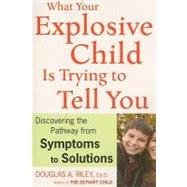
Note: Supplemental materials are not guaranteed with Rental or Used book purchases.
Purchase Benefits
What is included with this book?
| Acknowledgments | p. ix |
| Introduction | p. xv |
| I Am Not a Brat, Just a Child Who Needs Help | p. 1 |
| Changes and Transitions Make Me Explode | p. 12 |
| My Allergies Are Affecting the Way I Feel and Behave | p. 56 |
| I Don't Like Rules! | p. 75 |
| I'm a Wiggler and a Daydreamer | p. 101 |
| I Can't Control Myself at School | p. 116 |
| I Worry About Everything | p. 131 |
| Maybe I'm Depressed | p. 146 |
| It Seems Like Everyone Learns Faster Than Me | p. 162 |
| But I Like Playing with the Younger Kids | p. 176 |
| My Socks Aren't Right! | p. 189 |
| I'm Tired! | p. 196 |
| Ockham's Razor: A Guiding Principle for Decreasing Explosions | p. 213 |
| Final Thoughts on Living and Working with Explosive Children | p. 219 |
| Notes | p. 223 |
| Index | p. 237 |
| Table of Contents provided by Ingram. All Rights Reserved. |
The New copy of this book will include any supplemental materials advertised. Please check the title of the book to determine if it should include any access cards, study guides, lab manuals, CDs, etc.
The Used, Rental and eBook copies of this book are not guaranteed to include any supplemental materials. Typically, only the book itself is included. This is true even if the title states it includes any access cards, study guides, lab manuals, CDs, etc.